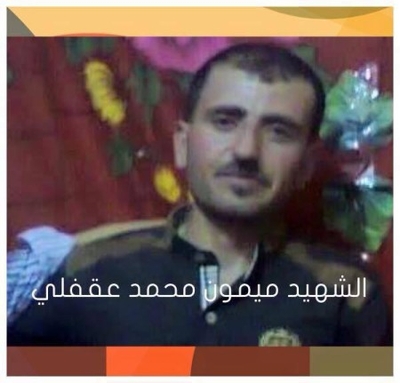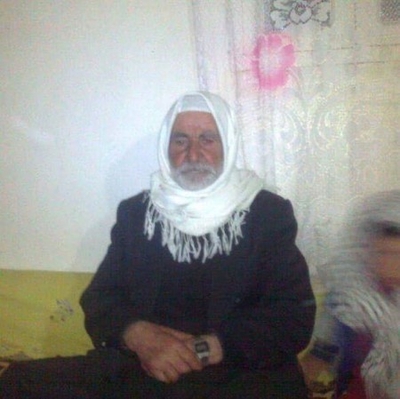On 10 June, a number of people in the village of Qalb Lawza- one of a collection of Druze villages in the Jabal al-Summaq region of Idlib province- were massacred in a confrontation with members of Jabhat al-Nusra, which dominates the area. Below are the names of those killed as a result of this clash. As is apparent from the family and middle names, many of these individuals appear to be close relatives of each other.
1. Sheikh Nadim Faris Shaheen
2. Sheikh Rasheed Sa'ad
3. Milad An'am Allah Razaq
4. Fakher Ahmad al-Shabali
5. Fakhro Ahmad al-Shabali
6. Ahmad Fakhro al-Shabali
7. Man'am Fakhro al-Shabali
8. Faraj Fakhro al-Shabali
9. Muhammad Sharif Aqfali
10. Faraj Fakhro al-Shabali
11. Aymenn Muhammad Aqfali
12. Maymun Muhammad Aqfali
13. Wissam Nazhat Hussein
14. Manhal Nazhat Hussein
15. Melham Faris Shaheen
16. Ahmad Muhammad Hussein
17. Muhammad Ahmad Hussein
18. Badro Khayro al-Shabali
19. Khayro Badro al-Shabali
20. Lami' Thabit al-Shabali
21. Hayder Fariz al-Shabali
22. Khayro Thabit al-Shabali
23. Rashad Faysal al-Shabali

Muhammad Sharif Aqfali (Abu Aymenn)

Badro Khayro al-Shabali

Aymenn Muhammad Aqfali, son of Abu Aymenn above.

Maymun Muhammad Aqfali

Rashad Faysal al-Shabali

Sheikh Rasheed Sa'ad

Ahmad Muhammad Hussein (Abu Muhammad)
Before giving the more immediate context of these killings, it should be noted that Qalb Lawza is one of the Druze villages in Idlib whose inhabitants were compelled at the beginning of this year to renounce the Druze faith and accept Sunni Islam at the hands of Jabhat al-Nusra, including destruction of Druze shrines and other Jabhat al-Nusra regulations such as gender segregation. These impositions have not been cancelled and remain in force to this day, which became clear not only in an interview carried out by Syria Direct in March 2015, but also most recently from the testimony of a resident of another of the villages- Kaftin- who agreed to speak to this author in the aftermath of the massacre on condition of anonymity. This is so despite supposed mediation efforts by Lebanese Druze leader Walid Jumblatt, who has tried to convince the Syrian Druze that their best interests will be guaranteed by throwing their weight behind the rebellion, even as Jabhat al-Nusra is heavily intertwined with that rebellion. Indeed, Jumblatt himself acknowledges the group's important role in the broader insurgency, and has thus tried to downplay its statusas a jihadist threat and al-Qa'ida affiliate. Nor have other rebel groups in Idlib province been able to mediate to cancel or mitigate this Islamization program imposed on the Druze of Jabal al-Summaq.
Not only has much media coverage of this latest incident in Qalb Lawza overlooked these facts, but Jabhat al-Nusra leader Abu Muhammad al-Jowlani has also tried to spin his group's treatment of the Druze in his interview with al-Jazeera that reflects a clear attempt to legitimise the group as a mainstream opposition force: commenting on the interviewer's praise of Jabhat al-Nusra's ostensible protection of the Druze villages, Jowlani portrayed his group's approach as one of mere da'wah(proselytization) and acceptance. It is true that Jabhat al-Nusra has generally not harmed the inhabitants of these villages, but only because they have accepted the imposed Islamization program, which is possible through religious dissimulation: in other words, true faith is in the heart, not outward practice, as one pro-regime Druze contact put it to this author at the time the impositions first came to light. In this context, one should note a statement issued from the village of Kaftin in early May 2015, officially denying allegations of mistreatment. Reading more closely, one soon realises this statement is an affirmation of the acceptance of the imposition of Sunni Islam and a call for other Druze to follow in this path:

"We the peoples of Jabal al-Summaq reject and condemn all who write about the situation of our land and they do not know the truth. The reality in which we live is that we are all well and no one attacks or oppresses us, and we are living in this land and our program/direction is the Book of God [Qur'an] and the Sunnah of His Prophet Muhammad (PBUH). And we confirm that we have the same rights as our Muslim brothers and what is upon them is upon us from the obligations in accordance with what Islamic law demands, as brought in the noble Hadith: '...Be brothers, servants of God. The Muslim is the brother of the Muslim: he does not oppress him, nor does he fail him, nor does he despise him...Every Muslim is sacrosanct on the Muslim, including his blood, wealth and honour.' As for what has been mentioned in the media regarding the opening of our homes to our Muslim brothers, we have undertaken our human and Shari'a obligation, and we have offered aid to the poor.
And we confirm that we have been present in our land for thousands of years and no one has been able to make us leave, force us to migrate, or challenge our Arab identity because we are genuine Arabs from the descendants of Qahtan. We have roots in history and deep ethnic and primordial roots in Arab identity and Islam. And our Ansar ancestors who supported Our Prophet Muhammad (PBUH) in al-Madina al-Munawara, and when a part of our affair was reduced, our poet, the companion Nu'man bin Bashir al-Ansari said:
[...]
On the basis of the guidance of our Prophet al-Mustafa (PBUH), indeed religion is advice and we call on all to return to the authentic Book of God...and that (God) place us and them among the guided guiders calling to God the Lord of the Worlds. And we urge all who have deviated from the authentic path through ignorance or knowingly to correct their path and return to the straight path [...]
Kaftin: 20 Rajab 1436 AH"
Unlike the Druze areas of the south, which have seen many soldiers fight and die for the Syrian army even as resistance to conscription has grown, the Druze villages of Jabal al-Summaq have generally been known for a neutral stance towards the conflict, while giving refuge to displaced persons, as the Kaftain statement also affirms. This author's contact from Kaftin, for instance, claims to have hosted 80 displaced people since the regime first attacked the villages that rose up in revolt. He also says only a handful of people from Jabal al-Summaq have joined armed groups in this conflict.
However, since becoming dominant in Jabal al-Summaq, Jabhat al-Nusra has been confiscating properties in the area of people living outside the villages, either giving them to their own members to dwell in or to internally displaced persons. In the latest case in Qalb Lawza, Jabhat al-Nusra seems to have tried to confiscate the home of a man living in regime-held Syria, on the grounds that he is a soldier in the regime army. This home though was apparently within the property of relatives of the man, who confronted members of the group as they were trying to build a wall on the property, eventually leading to an opening of fire on residents by the Jabhat al-Nusra members.
In a statement on the incident in Qalb Lawza, Jabhat al-Nusra describes the event as an "unjustified error that occurred without the leadership's knowledge, and the village and its people continue to live securely and calmly under our protection and in areas of our control," while declaring that those involved in the mishap will come before a Shari'a court to ascertain what happened and decide on the appropriate rulings. Further, Jabhat al-Nusra claims it has only directed its arms against those who have infringed on the "blood and honour of the Muslims from the gangs of the criminal Nusayri [Alawite] army, the heretic khawarij [Islamic State] and the gangs of the corrupt ones," while portraying itself as transparent: "the doors of Jabhat al-Nusra are open to all." Yet the statement makes no explicit reference to Druze at all, and in talking of defending Muslims, sugarcoats the real reason why the inhabitants of this village and others in Jabal al-Summaq are officially protected.
A number of rebel groups (Ahrar al-Sham, Levant Front, Ajnad al-Sham Islamic Union, Kata'ib Thuwar al-Sham, 'Go on the Right Path as You Have Been Ordered' grouping) also issued a joint statement on the incident, differing somewhat from Jabhat al-Nusra's account of the events in that Ahrar al-Sham is given the role of mediator and putting a stop to the bloodshed. Unlike Jabhat al-Nusra, the statement explicitly makes reference to "sons of the Druze sect" in reference to Qalb Lawza, and hails their "support for the Syrian revolution and giving refuge to the sons of their homeland who have fled from all areas of Idlib province under pressure of the bombing of the Assad regime and its criminal actions." The statement continues with a condemnation of the incident, a call for neutral Shari'a court arbitration, a declaration of the incident as a contravention of Islam that forbids the unjust spilling of blood of members of any sect, and a promise to work to coordinate with members of all other sects to prevent this kind of incident from happening again in "liberated areas." Declaring (like Jabhat al-Nusra's statement) that arms are only to be directed at the regime, the Islamic State and their allies, the joint declaration concludes with an ostensible non-sectarian stance that the "revolution is a people's revolution."
Impressive as the joint statement may sound, it is still problematic in overlooking the point that Jabhat al-Nusra has forced the Druze of Jabal al-Summaq to profess Sunni Islam, and there is little these rebel groups can do about it. Indeed, considering how closely they have all coordinated particularly in the recent Idlib gains that have almost entirely expelled the regime presence from Idlib, the other rebels cannot afford a full-blown confrontation with Jabhat al-Nusra.
More generally, Jabhat al-Nusra's treatment of the Druze of Idlib reflects two different strands of the group that have emerged. On the one hand, in areas it dominates/controls as strongholds, the group exhibits a more hardline face through its Dar al-Qada judicial front body and its implementation of Islamic law, even though there is no pretence to being a complete state in the manner the Islamic State presents itself: that is, whereas the Islamic State claims its own services departments like the Diwan al-Khidamat, in its own strongholds Jabhat al-Nusra appears to allow independent civilian service councils to function. On the other hand, Jabhat al-Nusra's embedding within the Jaysh al-Fatah coalition and its advances reflects the traditional picture of the group that emerged over the course of the Syrian civil war as a conciliatory force willing to work with other factions militarily and in administration of newly taken areas, only pursuing a very gradualist strategy of consolidation.
Finally, analysts should consider how this incident in Qalb Lawza will resonate with the Druze in the south as rebels edge into Suwayda province with the fight over Tha'ala airbase. More mainstream rebels in the south may try to reassure the Druze they have no interest in sectarian bloodshed, but the ongoing coordination with Jabhat al-Nusra may prevent the alleviation of concerns regarding the rebels' intentions.

